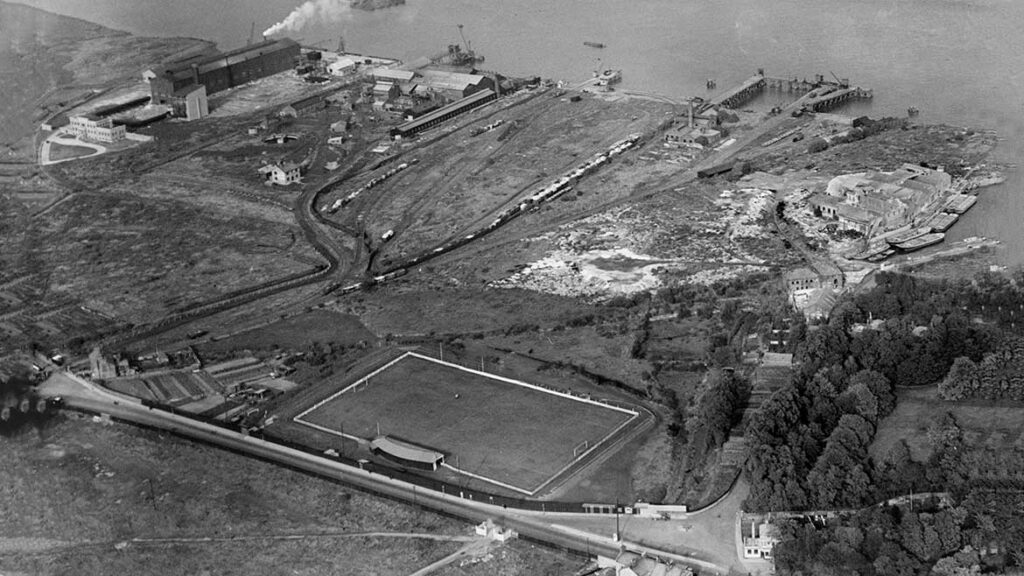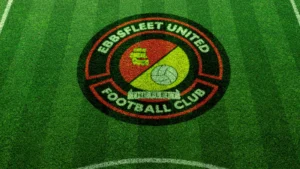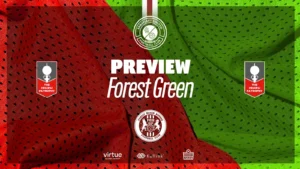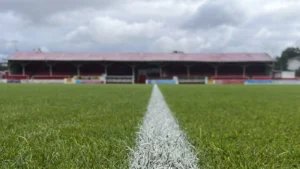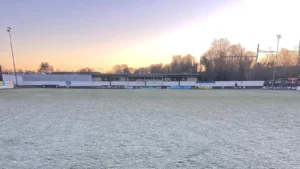There have been some exotic visitors to Stonebridge Road down the years. We have hosted Racing Club de Calais, European champions Nottingham Forest and Sunderland to name a few.
But in our stadium’s first flush of youth, when it was just five years old to be precise and before even the old wooden main stand had been erected, our visitors came almost 4,000 miles to grace us with their presence.
That was almost exactly 110 years ago. In December 1910, five years after the Northfleet Sports Ground (as Stonebridge Road was then better known) had first opened its doors, it served as a venue for one of the first games of American football ever contested in England.
That month saw four battleships of the US Atlantic Fleet – USS Georgia, Rhode Island, Nebraska and Virginia – visit Britain on a goodwill mission. They moored along the Thames at Gravesend and their arrival prompted the Daily Mirror to sponsor a challenge match. It was the third in a series of games in what subsequently became known as the Daily Mirror Silver Cup.

The first, which took place on Thanksgiving Day, 23rd November, at Crystal Palace between the USS Idaho and USS Vermont saw the former win 19-0 in front of a crowd of 10,000.
A second game followed on 3rd December, also at Crystal Palace, and it continued to bring in the crowds, with 12,000 people watching the Idaho win again, this time against the USS Connecticut.
With the four battleships docked in the Thames Estuary through December, the Mirror announced a third Silver Cup to take place between the USS Georgia and USS Rhode Island.
Northfleet United’s ever-alert chairman Joe Lingham, never one to let an opportunity to boost the club’s coffers pass him by, had gotten wind of the game and arranged for it to take place at Stonebridge Road.

Local newspapers report the game as taking place on 14th December, though the Mirror records it as Christmas Eve – however, this must be wrong as Northfleet played their two annual fixtures against rivals Gravesend on Christmas Eve and Boxing Day.
News spread rapidly throughout north Kent that the county’s first-ever game of American football – and only England’s third – was to take place and interest was huge.
The game was due to begin at 2pm but already an hour before that the ground was filling quickly. Some 4,500 spectators packed into the then-sparse Sports Ground which boasted only a tiny enclosure and the small ornate stand from Rosherville Gardens in those days.
Earlier that morning, petty officers from the Rhode Island had disembarked their ship to mark out the Stonebridge Road pitch for American football. At midday, servicemen from the Georgia arrived with a set of posts which they secured to the ‘soccer goals’ at either end of the ground by means of ropes affixed to the existing posts and then pegged into the ground to hold them.
At 1.30pm, the Northfleet spectators were reportedly amused to see the players emerge from the tunnel in full body ‘armour’ consisting of helmets and padding as they set about half an hour of hard running, tackling and passing that must have seemed quite alien to the English football fans.
Sailors from both US ships mingled with the nonplussed locals, explaining the rules of the game as best they could before the main attraction got under way at 2pm.

(Photo: US Naval Historical Center)
Having mocked the ‘armour’ worn by the players in the warm-up, the locals soon began to see why it might be necessary as both teams played a rough, tough and brutal first quarter.
The Georgia right-half, a sailor by the name of Gibson, was time and again penalised for trying to hurdle his tacklers and on one occasion he knocked out a Rhode Island player, who was eventually revived after being doused with several buckets of cold water.
The “relentless pummelling”, as it was reported, continued into the second and third quarters and play was repeatedly stopped to iron out disagreements that arose. These were principally due to an interpretation of the rules, with the sport’s governing body having issued new instructions earlier that year.
Captains from both vessels had to be called in to decide on the new rules as stoppage after stoppage baffled the Northfleet public – who were well known in their own sporting circles for having only so much patience with officials.
Their patience was stretched even further by the surprisingly scoreless nature of the game – though the Georgia side made up for that in the final quarter.
It was a quarter that almost never took place after one more argument that was so lengthy and fierce that it threatened to turn into a mass brawl until both teams eventually settled on conforming to the new rules on the order of the Rhode Island’s commanding officer, John Hood.
Georgia claimed five points for an unconverted touchdown and six more points for two field goals in that final quarter, giving them the victory to the tune of 11-0.
The Northfleet fans went away “largely baffled” commented the South Eastern Gazette. “At times rough, bordering on the brutal, with bursts of adventure” it was an experience “worth the shillings, if at times all too frequently displaying an approach to sporting laws best described as unfathomable nonsense.”
The fans seemed to enjoy the afternoon, however, as they showed their appreciation by lining Northfleet High Street to cheer the American sailors in their crisp white uniforms as they returned to their ships.
Certainly it proved to offer a degree of light entertainment
for the Northfleet fans who within three days were back down to earth with a bump, having lost 5-0 at home to Sheppey United in a game they understood rather better.
Nonetheless, it had been a good pay day for the Fleet. Meanwhile, for the sport of American football, Stonebridge Road (or should that be The Stonebowl?!) would prove to be the last patch of English soil on which it was played for another generation, when US forces stationed here during the Second World War reintroduced it.
*Background info by John M. Jones‘ publication ‘American Football in Kent 1910’
